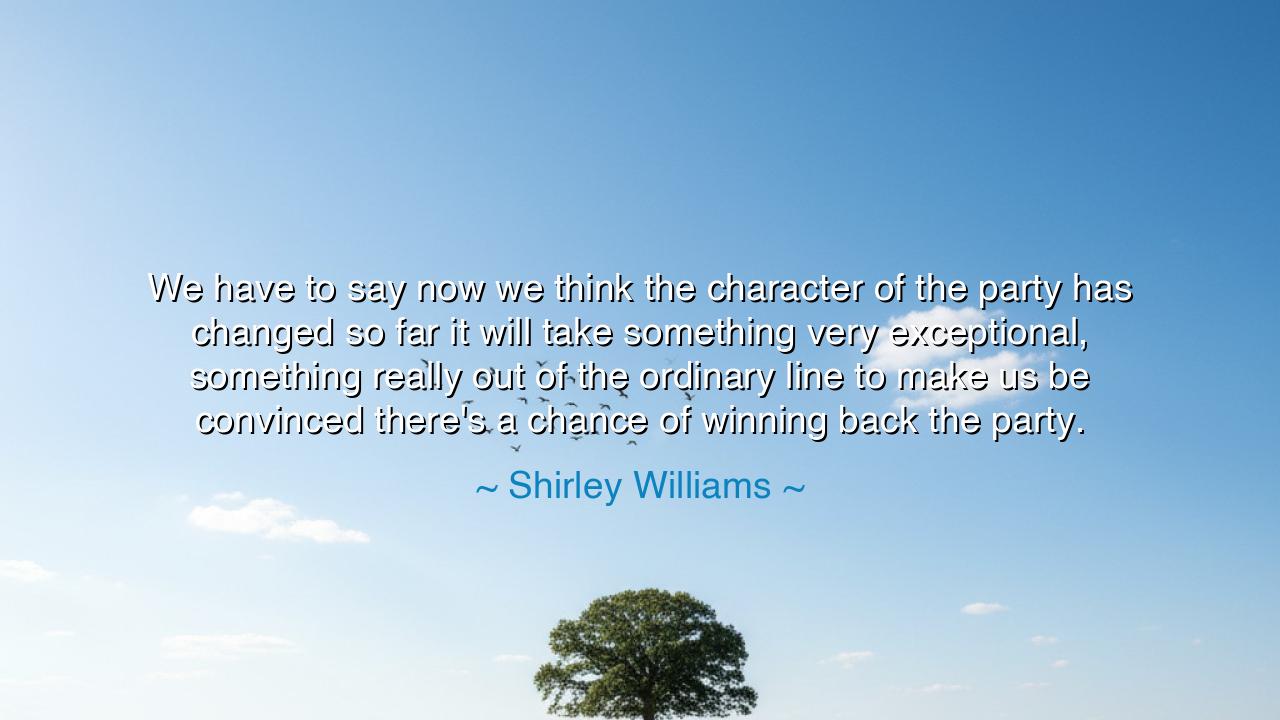
We have to say now we think the character of the party has
We have to say now we think the character of the party has changed so far it will take something very exceptional, something really out of the ordinary line to make us be convinced there's a chance of winning back the party.






In the ever-evolving tides of politics, there comes a moment when the character of a movement, a group, or even a nation shifts so dramatically that it seems to lose its original purpose, its core essence. In these moments, the words of Shirley Williams ring with the weight of truth: "We have to say now we think the character of the party has changed so far it will take something very exceptional, something really out of the ordinary line to make us be convinced there's a chance of winning back the party." This statement, though rooted in the world of political change, carries a deeper meaning for all of us. It speaks not only to the betrayal of an organization’s core values, but also to the profound disillusionment that arises when change takes a turn for the worse, and the hope of returning to purpose seems distant and uncertain.
This wisdom is ancient, for the great thinkers of old, such as Plato and Aristotle, pondered the nature of virtue and corruption in both individuals and societies. Plato, in his work The Republic, warned of the dangers of a society where those in power drift too far from justice and integrity, becoming consumed by the pursuit of their own interests. A society that loses its foundational values is one in which change becomes inevitable, but not necessarily for the better. When a group, like a political party or a community, compromises its core values, it faces the daunting task of rebuilding trust and reclaiming its true purpose. Williams' words speak to this profound truth—once the character of a group has been altered to such an extent, exceptional efforts are required to restore it to its former strength.
Consider the story of the Roman Republic, whose decline came not in a single event but through the gradual erosion of its founding principles. In its early days, Rome stood as a beacon of virtue, with power divided among the people and their representatives, ensuring that no one could rise above the common good. However, over time, the power of the Senate weakened, and political corruption, driven by personal ambition, gradually consumed the Republic. It was only in Caesar's rise to power—marked by actions both brilliant and dangerous—that those who loved the Republic realized how far they had strayed from their core ideals. Once a beacon of democracy, Rome had transformed into an empire ruled by the whims of a single man. The exceptional actions of Caesar and later leaders could not restore Rome to its former virtuous self, and the consequences were felt for centuries.
Much like the Roman Republic, the party Williams speaks of has faced a similar erosion of values, a shift in character that challenges the beliefs of its founders. In such moments, it becomes clear that the founding ideals must be reevaluated and defended, lest the party or movement lose its way entirely. In history, we see such shifts play out in various forms. Mahatma Gandhi faced such a moment in India’s struggle for independence, where many of his peers were willing to abandon his principles of non-violence in favor of more aggressive tactics. Gandhi’s challenge was to keep the movement’s soul intact while achieving the same goals. This was a delicate balance, requiring him to take exceptional action and to convince others that a return to his ideals was not only possible but necessary.
In our own time, when faced with the disillusionment of seeing the core values of a group or party shift, we too must ask ourselves: what is worth fighting for? Williams' statement calls us to evaluate whether the goals we once believed in can still be achieved within the current framework or whether a radical change is necessary. Exceptional change is not always about overhauling everything; sometimes it requires reaffirming the values that were once sacred, pulling them from the shadows and into the light of truth. Much like the reformers of the past, we must decide whether to strive for transformation from within or to take a bold stand and reimagine our course.
The lesson in Shirley Williams’ words, then, is this: values matter, and when the character of a group has been compromised, it is not enough to simply hope for things to return to normal. We must be willing to take exceptional actions—actions that are bold, thoughtful, and rooted in the very ideals that once guided us. Just as Caesar’s rise was a dramatic shift that could not restore the Roman Republic, so too must we acknowledge when a movement has lost its way and seek to restore it with courage and wisdom. Restoration requires more than words; it requires action, it requires the will to confront the truth and rebuild from the foundation up.
In your own life, whether in politics, relationships, or personal growth, remember that the character of what you cherish will not remain intact without attention and care. Disruption is often inevitable, but restoration is possible if you are willing to make the exceptional effort. Whether you are in a position of power or simply striving to influence the world around you, know that it is your actions, driven by principle, that will determine whether you restore the soul of what you care about, or whether you allow it to decay. Like the leaders of old, you have the power to choose the path that will either guide you toward renewal or let the destruction continue. The strength to change and restore lies within you.






AAdministratorAdministrator
Welcome, honored guests. Please leave a comment, we will respond soon